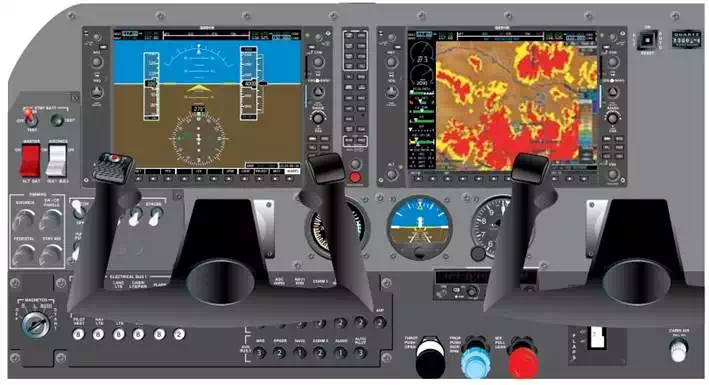Microelectromechanical Based Attitude and Directional Systems
On aircraft, microelectromechanical systems (MEMS) devices save space and weight. Through the use of solid-state MEMS devices, reliability is increased primarily due to the lack of moving parts. The development of MEMS technology for use in aviation instrumentation integrates with the use of ADCs. This newest improvement in technology is low cost and promises to proliferate through all forms of aviation.
MEMS for gyroscopic applications are used in small, general aviation aircraft, as well as larger commercial aircraft. Tiny vibration-based units with resistance and capacitance measuring pick-offs are accurate and reliable and only a few millimeters in length and width. They are normally integrated into a complete micro-electronic solid-state chip designed to yield an output after various conditioning processes are performed. The chips, which are analogous to tiny circuit boards, can be packaged for installation inside a dedicated computer or module that is installed on the aircraft.
While a large mechanical gyroscope spins in a plane, its rigidity in space is used to observe and measure the movement of the aircraft. The basis of operation of many MEMS gyroscopes is the same despite their tiny size. The difference is that a vibrating or oscillating piezoelectric device replaces the spinning, weighted ring of the mechanical gyro. Still, once set in motion, any out-of-plane motion is detectable by varying microvoltages or capacitances detected through geometrically arranged pickups. Since piezoelectric substances have a relationship between movement and electricity, microelectrical stimulation can set a piezoelectric gyro in motion and the tiny voltages produced via the movement in the piezo can be extracted. They can be input as the required variables needed to compute attitude or direction information.

The relative scale size of a MEMS gyro.
Other Attitude and Directional Systems
In modern aircraft, attitude heading and reference systems (AHRS) have taken the place of the gyroscope and other individual instruments. While MEMS devices provide part of the attitude information for the system, GPS, solid state magnetometers, solid state accelerometers, and digital air data signals are all combined in an AHRS to compute and output highly reliable information for display on a cockpit panel.

Instrumentation displayed within a glass cockpit using an attitude heading and reference system (AHRS) computer.